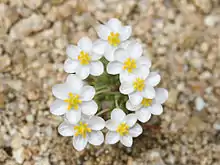Canbya candida
Canbya candida (common names: pygmy poppy, white pygmy poppy) is a tiny, white flowered annual plant in the genus Canbya of the poppy family. It is found in the western Mojave Desert of Southern California. It grows 1–3 cm (3⁄8–1+1⁄8 in) tall. Its leaves are 5–9 mm (3⁄16–11⁄32 in) long. The flowers are borne in leaf axils, and have 5–7 white petals that are each 3–4 mm (1⁄8–5⁄32 in) long, and 6-9 stamens.
| Canbya candida | |
|---|---|
 | |
| Scientific classification | |
| Kingdom: | Plantae |
| Clade: | Tracheophytes |
| Clade: | Angiosperms |
| Clade: | Eudicots |
| Order: | Ranunculales |
| Family: | Papaveraceae |
| Genus: | Canbya |
| Species: | C. candida |
| Binomial name | |
| Canbya candida Parry ex A.Gray | |
References
- "NatureServe Explorer". NatureServe Explorer. NatureServe. 2022. Retrieved 19 May 2022.
- Clark, Curtis; Kiger, Robert W. (1997). "Canbya candida". In Flora of North America Editorial Committee (ed.). Flora of North America North of Mexico (FNA). Vol. 3. New York and Oxford: Oxford University Press – via eFloras.org, Missouri Botanical Garden, St. Louis, MO & Harvard University Herbaria, Cambridge, MA.
- "Canbya candida". County-level distribution map from the North American Plant Atlas (NAPA). Biota of North America Program (BONAP). 2014.
- Grey-Wilson, Christopher (2000). Poppies. Portland: Timber Press. p. 229. ISBN 0-88192-503-9.
- Hitchcock, C. H.; Cronquist, A.J.; Ownbey, F. M.; Thompson, J. W. (1984). "Salicaceae to Saxifragaceae". In Hitchcock, C. L. (ed.). Vascular Plants of the Pacific Northwest. Vol. 2. Seattle: University of Washington Press.
This article is issued from Wikipedia. The text is licensed under Creative Commons - Attribution - Sharealike. Additional terms may apply for the media files.
